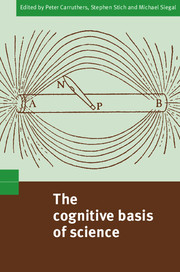1 - Introduction: what makes science possible?
Published online by Cambridge University Press: 23 November 2009
Summary
In this brief opening chapter we briskly review some of the recent debates within philosophy and psychology which set the stage for the present collection of essays. We then introduce the essays themselves, stressing the inter-linking themes and cross-connections between them.
Introduction
The central position of science in our contemporary world needs no emphasis. Without science (broadly construed, to include all forms of technical innovation) we would still be roaming the savannahs of Africa like our Homo habilis ancestors, digging up tubers and scavenging scraps of meat. And without science (construed narrowly, as involving the application of an experimental method) we would have seen none of the advances in knowledge, technology and accumulation of wealth which have transformed the world and most of its people in just the last four centuries or so. Science now touches every aspect of our lives, from cradle (indeed, sometimes from conception) to grave. Given the manifest importance of science, the search for a scientific understanding of scientific thought and activity itself should need no further motivating. But in fact, the attempt to explain scientific cognition is not only extremely hard, but raises a whole host of fascinating and puzzling questions about the nature, development and operations of the human mind, and its interactions with culture.
This book is about the question: what makes science possible? Specifically, what features of the human mind, of human cognitive development and of human social arrangements permit and facilitate the conduct of science?
- Type
- Chapter
- Information
- The Cognitive Basis of Science , pp. 1 - 20Publisher: Cambridge University PressPrint publication year: 2002

